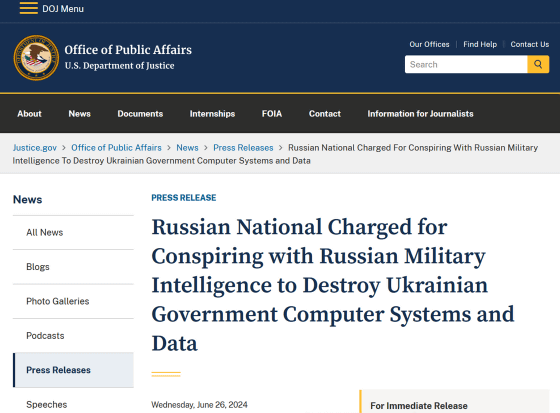The US Department of Justice announced that a Russian man who hacked Ukrainian government agencies before Russia's invasion has been indicted, and there is also a reward of up to 1.6 billion yen for information provided.

The U.S. Department of Justice announced that a Russian hacker who hacked into Ukrainian government agencies in January 2022, before Russia began its invasion of Ukraine, has been indicted on charges of hacking and destruction of computer systems and data. Information on the hacker's location and activities will be rewarded up to $10 million (approximately 1.6 billion yen) under the U.S. Department of State's
Office of Public Affairs | Russian National Charged for Conspiring with Russian Military Intelligence to Destroy Ukrainian Government Computer Systems and Data | United States Department of Justice
https://www.justice.gov/opa/pr/russian-national-charged-conspiring-russia-military-intelligence-destroy-ukrainian

Russian man indicted for cybersecurity attack on Ukraine ahead of war invasion - The Washington Post
https://www.washingtonpost.com/dc-md-va/2024/06/26/10m-offered-russian-accused-whispergate-malware-attack-ukraine/
US charges Russian in Ukraine hack, offers $10 million reward | Reuters
https://www.reuters.com/world/us-charges-russian-ukraine-hack-offers-10-million-reward-2024-06-26/
In January 2022, prior to Russia's invasion of Ukraine, dozens of Ukrainian government agencies, including agricultural, education, science and emergency services, were hacked. The wiper used in the attack, called WhisperGate, appeared to be a ransomware that encrypted PC files and demanded a ransom, but in fact completely deleted the files.
For more information on Whispergate attacks, please read the following article:
Microsoft identifies destructive malware targeting Ukrainian government agencies, looks like ransomware but has no ransom collection mechanism - GIGAZINE

In the Whispergate case, a federal grand jury in Maryland, USA, indicted Amin Tigovich Stigall, a Russian national, on charges of hacking and destroying computer systems and data. According to the indictment, Stigall worked with the Main Intelligence Directorate of the Russian Armed Forces General Staff to hack into Ukrainian government agencies using the services of a US-based company. At the time of writing, Stigall, who was 22 years old, used false identities, computer networks spanning the world, and virtual currencies to hide his connection to the Russian government.
Amin Timovich Stigal is wanted by the #FBI in Maryland for his alleged involvement in criminal cyber activities targeting Ukrainian critical infrastructure between August 2021 and February 2022. @RFJ_USA is offering a reward up to $10 million. https://t.co/8iWaTGjNYm pic.twitter.com/JiXcmCrE6e
— FBI Baltimore (@FBIBaltimore) June 26, 2024
The hacking of Ukrainian government agencies is believed to have been aimed at sowing distrust among Ukrainians in their government systems. According to federal prosecutors, a message was displayed on a Ukrainian digital portal service in Polish, Russian and Ukrainian that read, 'Citizens of Ukraine! All information about you has been made public. Be afraid and prepare for the worst. This affects your past, present and future.'
Stigall also hacked the transportation infrastructure of a Central European country that was supporting Ukraine in August 2022 after Russia's invasion of Ukraine began, and is reported to have probed computers at federal agencies in Maryland from August 2021 to February 2022. It has not been mentioned whether the probing in Maryland led to the hacking.
Stigall faces up to five years in prison if convicted, but remains at large as of the time of writing. The U.S. State Department's Rewards for Justice program offers a reward of up to $10 million for information regarding Stigall's location or cyber activities.

U.S. Attorney General Merrick Garland said, 'The defendants conspired with Russian military intelligence to launch cyber attacks against the Ukrainian government and then allies, including the United States, prior to Russia's unjust and unprovoked invasion of Ukraine. The Department of Justice will continue to stand with Ukraine in all aspects of its fight against Russia's war of aggression, including holding accountable those who support Russia's malicious cyber activity.'
Related Posts:
in Security, Posted by log1h_ik







